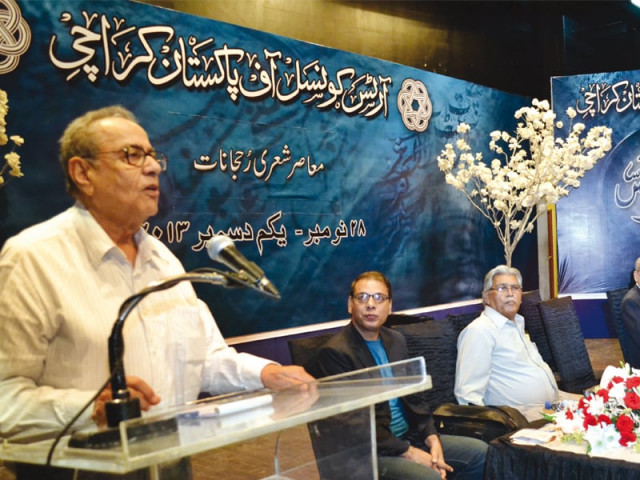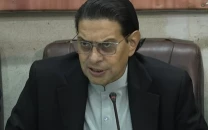Sixth International Urdu conference: Indian poets say they started writing on women after Pakistan
Terrorism, karo-kari are some new trends highlighted in poetry, discuss Urdu literati.

Renowned Indian poet Dr Satyapal Anand speaks about the connection between Indian and Pakistani poetry on the second day of the sixth International Urdu Conference at the Karachi Arts Council on Friday. Khwaja Razi Haider, Dr Khursheed Rizvi, Prof Sahar Ansari, Dr Fatima Hasan and Dr Shahida Hasan also spoke on the occasion. PHOTO COURTESY: ARTS COUNCIL OF PAKISTAN
Indian poets have followed the footsteps of Pakistani poets when it came to writing about women but taboo subjects, such as karo-kari and divorce, are not so prevalent in India, admitted renowned Indian poet Dr Satyapal Anand.
The second day of the sixth International Urdu Conference was held at the Karachi Arts Council on Friday and it started with the issue of ‘Contemporary Trends in Urdu Poetry’ in Urdu. Dr Anand said that poetry on women in Pakistani clearly manifested the kinds of social injustices meted out to the fairer sex.

“In Pakistan, Urdu poetry took a new shape after the Zia era,” the Indian poet said. He believed that most of the trends started in India and were then followed by Pakistani poets, adding that his fellows in India also learned from the new trends that emerged in Pakistani poetic circles.
Dr Anand seemed not so comfortable with prose poetry, saying that he has never written such poems. “People won’t accept prose poetry until it takes a new shape.”
The speakers said that poets were new trends through Urdu poetry. “Trends are a creation of an era. It’s kind of an inspiration for poets,” said Prof Sahar Ansari, adding that terrorism, suicide bombings, karo-kari and child abuse are some of the new trends being highlighted.
“It takes time for new trends to become a part of literature,” said Prof Ansari, adding that it grows gradually. He also emphasised that poetry should be accepted by people. “A reader must be able to accept poetry and feel the poet is a companion— this phenomenon is called poetry.”
Famous scholar, poet and linguist Dr Khursheed Rizvi said that every poet has his own predisposition. “All poets have their own frequencies and they write what they feel around them.”
Giving the example of Sir Syed Ahmed Khan, Dr Rizvi said that the speech written by renowned Urdu poet Mirza Ghalib was an inspiration for Sir Syed: “The latter was not happy with that particular speech when he tried to highlight the need for new technologies being introduced by the West but we see Sir Syed was future-oriented,” he stressed.
Khwaja Razi Haider said different trends, including migration, had been raised by almost all Urdu poets. “Trends tell you the history of a particular era,” he added.
Haider criticised new poets by saying that most of the poets didn’t read famous poets. “They need to read before they write. It is a major reason we see ordinary trends now,” he commented.
Presenting her paper on prose poetry, renowned Urdu poetess Dr Fatima Hasan said prose poetry started in Pakistan in the 1960s after it was introduced in India in 1955. “It grew in 1970s and became a movement,” she added.
She traced the history of different trends in Urdu poetry. Quoting poet Qamar Jaleel’s point of view, she said that poetry represents one’s thinking towards a particular topic or issue. “A poet is a voice of a certain era. A poet represents an era,” she maintained.
Highlighting various trends in contemporary poetry, Dr Shahida Hasan said that new trends are being adopted by poets. She said that most of the poets tried to write about new topics. “New areas are being explored. Our contemporaries are well aware of new trends and it’s a good omen,” she added.
Published in The Express Tribune, November 30th, 2013.



















COMMENTS
Comments are moderated and generally will be posted if they are on-topic and not abusive.
For more information, please see our Comments FAQ